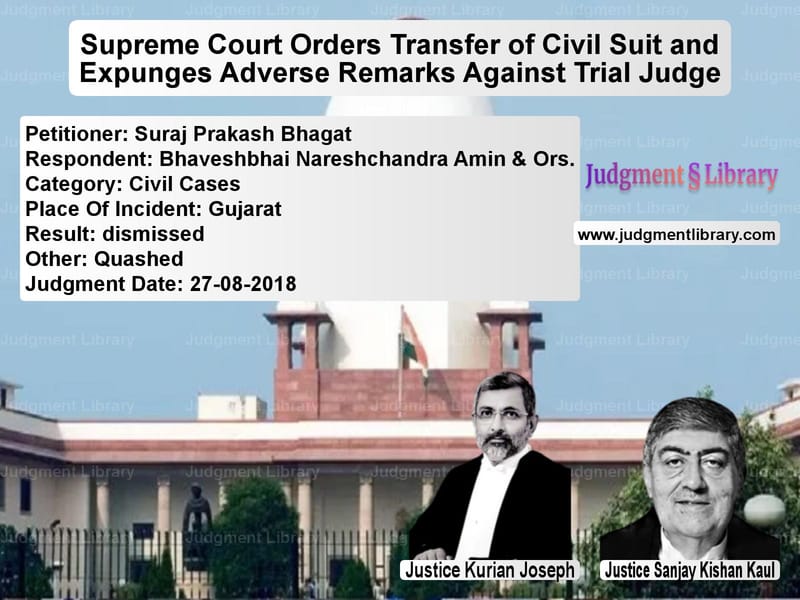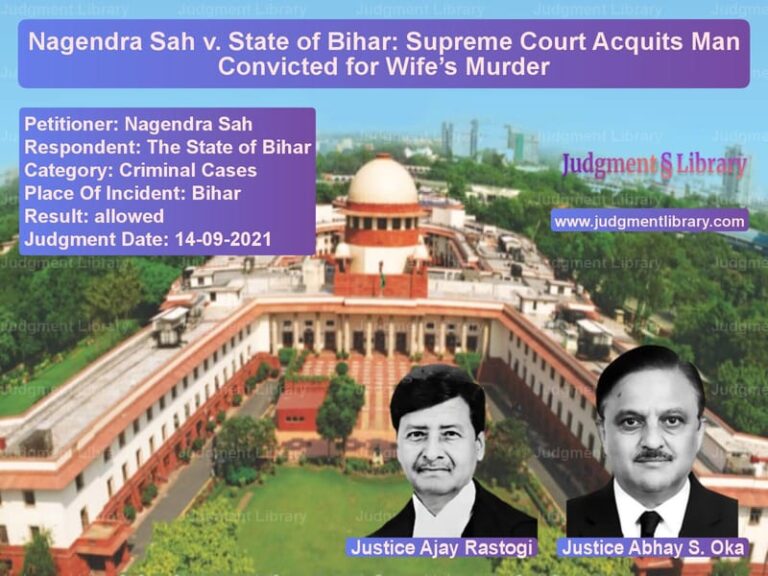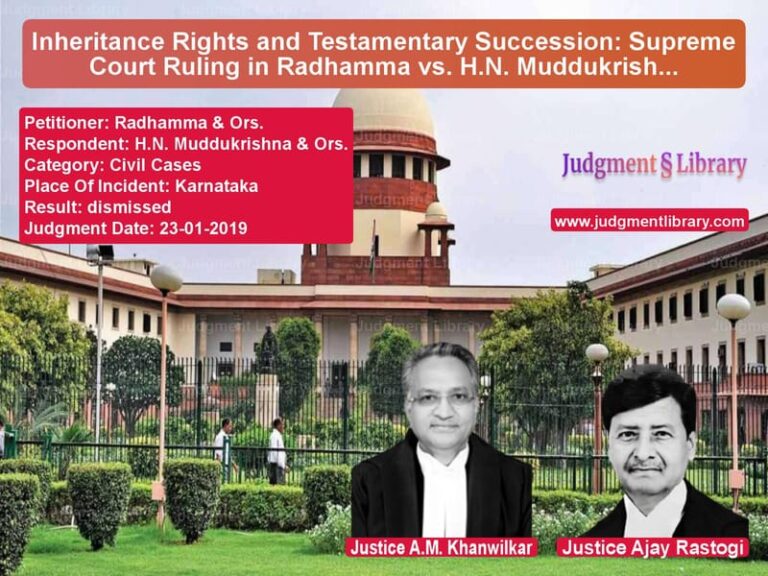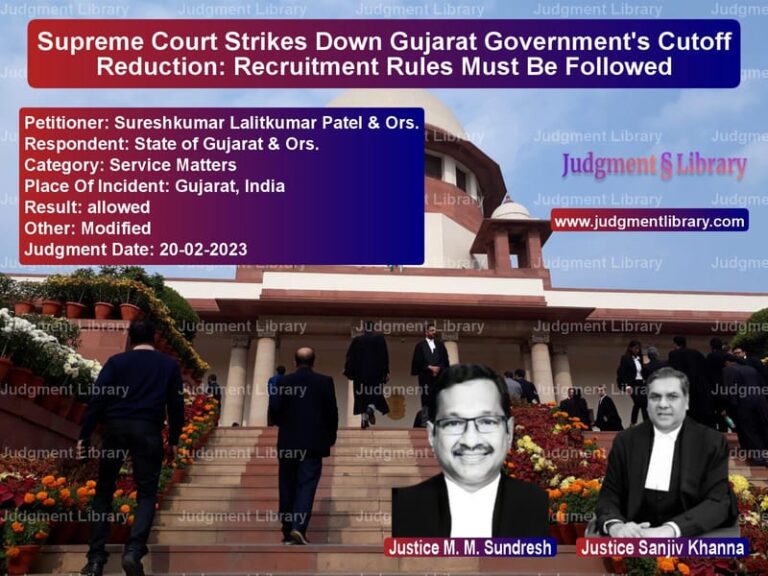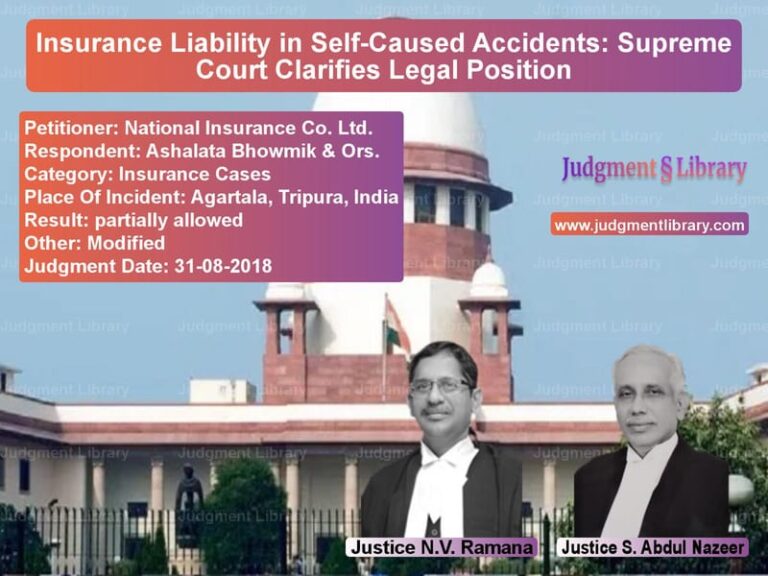Supreme Court Orders Transfer of Civil Suit and Expunges Adverse Remarks Against Trial Judge
The Supreme Court of India, in the case of Suraj Prakash Bhagat v. Bhaveshbhai Nareshchandra Amin & Ors., ruled on the transfer of a civil suit and the expunging of adverse remarks made against a trial judge. The judgment, delivered on August 27, 2018, by a bench comprising Justice Kurian Joseph and Justice Sanjay Kishan Kaul, emphasized the need for a fair and expeditious trial process in civil disputes.
Background of the Case
The appellant, Suraj Prakash Bhagat, was aggrieved by the order passed by the Gujarat High Court in Appeal from Order No.86 of 2018. The High Court had vacated the interim injunction granted in Special Civil Suit No.330 of 2017, which was pending before the 16th Additional Senior Civil Judge in Vadodara. Respondent No.3 filed an application seeking the transfer of the suit to a different court.
The appellant challenged the High Court’s decision, which also contained adverse remarks about the conduct of the trial judge. The case eventually reached the Supreme Court, where the appellant sought the transfer of the case and expunging of the adverse remarks made against the trial judge.
Petitioner’s (Appellant’s) Arguments
The appellant raised the following arguments:
- The High Court’s vacating of the interim injunction was unjustified as it undermined the trial process and caused undue hardship to the appellant.
- The adverse remarks made by the High Court against the trial judge were baseless and damaging to the judicial process.
- The transfer application made by Respondent No.3 was justified to ensure an unbiased and fair trial.
- The status quo regarding the title of the disputed property should be maintained during the pendency of the civil suit.
Respondent’s (Defendants’) Arguments
The respondents, represented by their legal counsel, countered with the following points:
- The transfer of the civil suit to another court was necessary to avoid any delays and ensure the case was handled efficiently.
- They had legitimate concerns about the trial process, which led them to seek the transfer and the vacation of the injunction.
- The appellant had not followed the correct legal process and had engaged in tactics to delay the proceedings.
Supreme Court’s Observations
The Supreme Court examined the matter and made the following observations:
- The High Court’s adverse remarks against the trial judge were uncalled for and were expunged by the Supreme Court.
- Fair trial is essential, and the transfer of the civil suit from the 16th Additional Senior Civil Judge to an appropriate court was deemed necessary for smooth proceedings.
- The parties should maintain status quo regarding the title of the property during the pendency of the civil suit.
- The Supreme Court also emphasized that the civil suit should proceed without being influenced by the observations made by the High Court or the trial court.
Final Judgment
The Supreme Court ruled in favor of the appellant and issued the following directives:
- The adverse remarks made by the High Court against the trial judge were expunged.
- The Principal District Judge, Vadodara, was directed to transfer the civil suit from the 16th Additional Senior Civil Judge to an appropriate court.
- The transferred court was directed to conclude the trial expeditiously.
- The status quo regarding the title of the property was to be maintained during the pendency of the civil suit.
- Respondent Nos.1 and 3 were permitted to approach the trial court if they sought to transfer the property, and such applications would be considered based on merits.
Impact of the Judgment
The ruling has significant implications for the handling of civil suits in the judicial system:
- Judicial Independence: The judgment reinforces the importance of impartiality in the judicial process, especially in matters of judicial conduct and the treatment of trial judges.
- Efficiency in Judicial Proceedings: The decision encourages the expeditious resolution of cases by ensuring they are not delayed by procedural challenges.
- Maintenance of Status Quo: The ruling stresses that the status quo should be maintained in property disputes to prevent any injustice during the pendency of the case.
Conclusion
The Supreme Court’s judgment in Suraj Prakash Bhagat v. Bhaveshbhai Nareshchandra Amin & Ors. is a landmark decision that emphasizes fairness, efficiency, and respect for judicial processes in civil suits. By expunging the adverse remarks against the trial judge and ensuring the smooth transfer of the case, the Court has ensured that justice is served impartially and expeditiously.
Petitioner Name: Suraj Prakash Bhagat.Respondent Name: Bhaveshbhai Nareshchandra Amin & Ors..Judgment By: Justice Kurian Joseph, Justice Sanjay Kishan Kaul.Place Of Incident: Gujarat.Judgment Date: 27-08-2018.
Don’t miss out on the full details! Download the complete judgment in PDF format below and gain valuable insights instantly!
Download Judgment: Suraj Prakash Bhagat vs Bhaveshbhai Nareshch Supreme Court of India Judgment Dated 27-08-2018.pdf
Direct Downlaod Judgment: Direct downlaod this Judgment
See all petitions in Property Disputes
See all petitions in Damages and Compensation
See all petitions in Succession and Wills
See all petitions in Judgment by Kurian Joseph
See all petitions in Judgment by Sanjay Kishan Kaul
See all petitions in dismissed
See all petitions in Quashed
See all petitions in supreme court of India judgments August 2018
See all petitions in 2018 judgments
See all posts in Civil Cases Category
See all allowed petitions in Civil Cases Category
See all Dismissed petitions in Civil Cases Category
See all partially allowed petitions in Civil Cases Category

